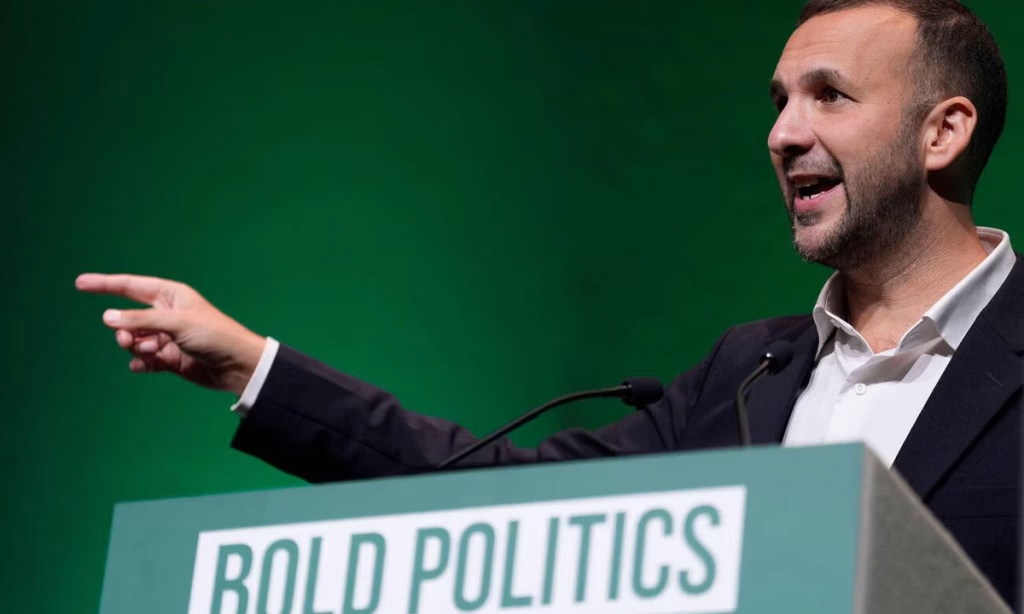The Green Party of England and Wales is riding high, with membership almost doubling over the past half year and the party gaining in the opinion polls. It is a similar story for Reform UK.
The “bold politics” of the Green Party’s leader, Zack Polanski, are in part intended to counter Reform. Support for both parties is defined by cultural issues. In the case of Reform, by the culture war around immigration and national identity; in the case of the Green Party by the wider picture of the linked issues of social justice and climate change.
How the cultural issues that underpin support for Reform might translate into a policy for the arts is an open question that is, at present, without any discernible answer. (Reform did not reply to The Art Newspaper’s request for information.) The introduction of “Doge”-like audits of the expenditure of Reform-led councils suggest that their arts policies would largely be the same as those of the Trump administration, whose Department of Government Efficiency (Doge) seeks to identify and eliminate wasteful spending.
Reform UK leader Nigel Farage wants English national identity to be officially promoted
© Gage Skidmore
Rather than a party manifesto, Reform UK has issued a “contract” with its members. On the subject of culture, the contract states only that “English national identity should be officially promoted and celebrated”, and that Reform would “scrap” the BBC.
Restitution push
At its conference in October, members of the Green Party passed a heritage and tourism paper, which offered a framework for policy on museums unique among UK political parties. The focus of Green Party arts policy is naturally on sustainability and inclusion, but it also places a strong emphasis on community ownership, giving localities the option of taking control of museums and other cultural buildings. Philip Nelson, the Green Party heritage and policy development lead, points to successful examples of community ownership—such as pubs—as a pattern that could be positively replicated in the case of small local museums.
The Greens propose setting up an expert panel for the restitution of cultural objects
One of the most striking Green policy proposals is the establishment of an expert panel for the restitution of cultural objects, modelled on the Spoliation Advisory Panel, the body set up in 2000 to advise the UK government on claims made against property looted during the Nazi period in Germany. Such a body would not only coordinate and steer restitution claims in the context of decolonisation but could also support and promote the research and collaboration by museum curators that has arisen over the past few decades, and help dispel the view that public museums are receptacles of morally lugubrious loot.
Debates about the carbon-intensive practices of museum conservation, storage and exhibition transportation are another strong entry point for Green Party policy influence on museum practice, putting calls for rethinking conservation needs and collections storage alongside the universal need to cut carbon emissions drastically. Rather than issuing directives for museums, however, as the conservator and heritage scientist Lynda Skipper has said, new alternative thinking on conservation and storage is best embedded in training and apprenticeship schemes, helping it become naturally part of the working life of museums in the near future.
Museum independence
How much policymakers can or should become involved directly in museums is a hot topic. Ed Vaizey, a former Conservative Party culture minister, writing on the Arts Professional website in September, suggests museums should be left to make their own decisions, rather than be required to submit to the “rigid prohibitions” he perceives, for example, in the Museum Association’s recently revised code of ethics. He argues that decisions such as what sort of sponsorship money is acceptable should be left up to individual institutions rather than be subject to outside policy diktats. His argument in turn points to a key challenge for any policy based on fostering local ownership of museums: how does such ownership and the running of museums work alongside broader codes of ethics and working practices?
Reinstating museum funding could be a ‘quick win’ for local politicians
The real policy issue remains the financial crisis, and the staggering drop in funding of local authority-run museums in the UK. As Tony Butler, the executive director of the Derby Museum Trust, points out, reinstating museum funding, which has dropped by 64% in the case of Derby museums, with a similar picture all around the country, is a ‘quick win’ for local politicians. Museums are at the heart of civic life and offer a sense of pride and belonging for local communities. A recent Art Fund survey shows that four in five Britons want to see an increase in funding, a view which reaches across the political and social spectrum.
£1bn green fund
The Arts Council announcement on 8 October of Museum Renewal Fund grants, distributing £20m to 75 institutions in Britain, shows just how urgent is the need for relatively small amounts of money to plug operational spending shortfalls. The Green Party proposes a £1bn green heritage and tourism regeneration fund, plus £250m for community ownership schemes for local museums, libraries and other cultural venues.
For many towns and cities, museums remain the last real public spaces, unfreighted by private interests, offering a place where social differences can be negotiated. With their long tradition of free entry, museums provide a vital and meaningful common centre ground at a time of dangerous political polarisation. Along with librarians, museum curators are our most trusted professions, according to a 2021 Ipsos poll, and play a key role in projecting soft power and meeting global challenges, in particular that of climate change. That the Green Party is emerging as a policy leader for the culture of museums in Britain should come as no surprise.
